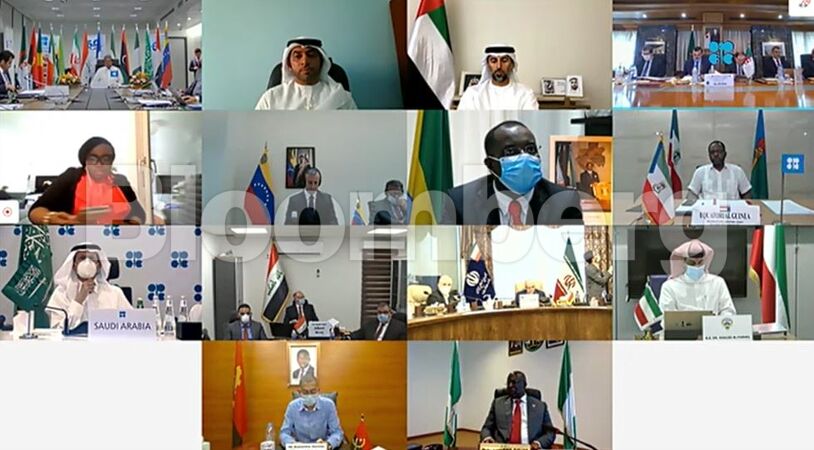By Javier Blas
The cartel appeared on the brink of a deal.
Then, a day later, the trouble started. The first OPEC output surveys, compiled by news organizations and consultants, showed that Angola, Iraq, Kazakhstan and Nigeria weren’t squeezing supply nearly as much as they had promised. Baghdad was the worst offender.

Cheating is as old as the OPEC system of production quotas, which goes back to the mid-1980s. Academics call it the “free rider” problem: Someone benefits from everyone else’s effort without contributing. In OPEC, ministers call it the “Pinocchio” problem.
Saudi Arabia had long urged other members to share the burden more equitably. Russia, a long-term laggard that has now converted to strict compliance, joined the Saudis in their push. It was as if the brief but vicious price war of earlier this year had never happened.
“All in all, mission accomplished,” said Harry Tchilinguirian, head of commodity market strategy at BNP Paribas SA. “But it would not have happened without Saudi Arabia and Russia coming together and singing from the same song sheet ahead of the meeting.”
Bluff and Drama
Initially, the four laggards resisted. What followed was a week-long drama that pitted Riyadh and Moscow against fellow oil nations, according to officials involved in the talks, consultants and oil traders, who asked not to be named. Everyone had an excuse, from technical problems to errors of measurement. But Moscow and Riyadh took a hard line.
The Russian delegation made clear the one-month extension was “contingent” on better compliance, according to a person familiar with the message. Days later, Novak explained his view during his OPEC+ opening speech: “It is important to note the market is still fragile and needs decisive action. So that’s why it’s now as important as ever to maintain 100% conformity.”
Saudi Arabia went a step further: Not only did it insist that compliance had to improve to 100%, it asked the cheaters to compensate for their past sins. They would have to cut deeper from July to September to make up for their over-production in May and June — a particularly painful punishment just as oil prices are rising.
Soon, Prince Abdulaziz, a seasoned oil diplomat, rallied other members behind his proposal and he presented an ultimatum: The whole OPEC+ agreement was contingent on the four countries accepting the concept of compensation.
After some diplomatic wrangling, Nigeria, Angola and Kazakhstan bowed to the pressure. But Iraq was resolutely against the deal. Ali Allawi, who was representing Iraq as acting oil minister, sent a letter saying Baghdad would only be able to fulfill its quota by the end of July — and rejected the idea of compensation.
With the talks at an impasse, Russia and Saudi Arabia told everyone that the early June 4 meeting wouldn’t go ahead, and threatened to cancel the long-planned June 10 gathering too.
For many, it was a bluff: Riyadh and Moscow could ill-afford another price war, particularly as U.S. President Donald Trump had brokered the peace deal. But it worked. In diplomatic talks on June 5, Iraq dropped its objections. OPEC immediately called a meeting for the following day — a Saturday.
When OPEC ministers sat down on June 6, the virtual gathering turned into a rubber-stamp exercise. The final communique, which for the first time in OPEC history incorporated the concept of compensation, was a personal vindication for Prince Abdulaziz, who had been pushing fellow members to stop cheating since his appointment last year.
Still, oil traders question whether the effort will pay off. Iraq and the other three laggards may have signed up to the compensation concept, but Saudi Arabia and Russia lack a credible enforcement mechanism. If Baghdad choses to cheat again, Riyadh and Moscow’s only recourse would be to launch a price war that would punish them too.
Brent futures rose 52 cents, or 1.2%, to $42.82 a barrel as of 10:55 a.m. Singapore time after climbing as much as 2.6% earlier. The global benchmark posted a sixth weekly gain on Friday.
But for Saudi Arabia, OPEC+ cohesion, both real and apparent is crucial. Riyadh believes it’s key to convince the oil market the cartel is firmly in control. “We have all made sacrifices to get where we are today,” Prince Abdulaziz told fellow ministers on Saturday. “But those sacrifices will be in vain if we do not continue in a genuine spirit of mutual trust and shared responsibility. Together we are stronger.”
Share This:




 CDN NEWS |
CDN NEWS |  US NEWS
US NEWS 




























COMMENTARY: Fossil Fuels Show Staying Power as EU Clean Energy Output Dips – Maguire